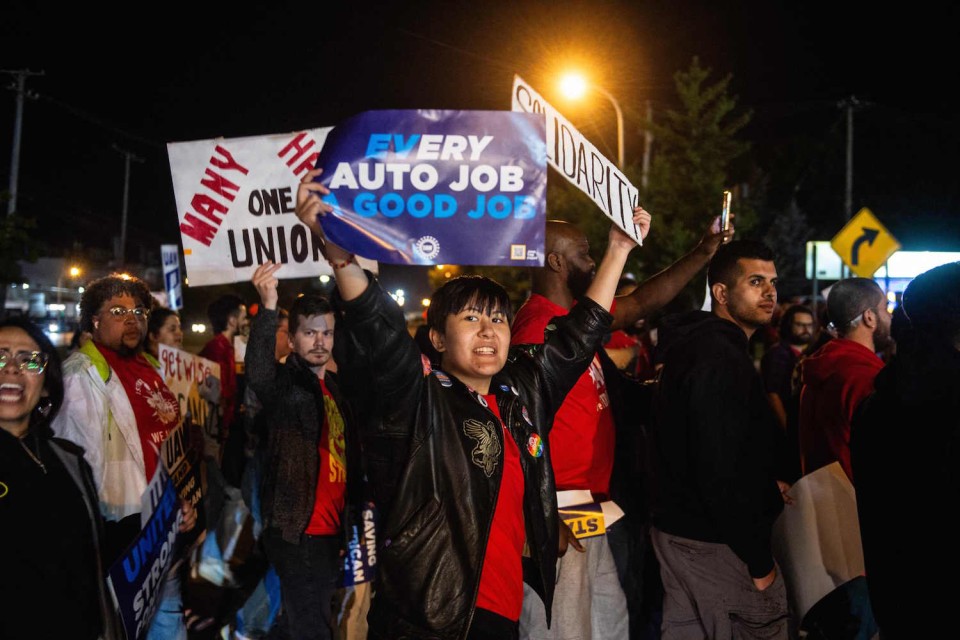
“Tonight, for the first time in our history, we will strike all three of the Big Three at once,” UAW President Shawn Fain said in a webcast two hours before the midnight contract expiration at the three major automakers. (Photo by Matthew Hatcher / AFP)
WAYNE, United States, Sept 15, 2023 (AFP) – The US auto workers’ union launched a targeted strike at three factories just after midnight on Friday, ordering simultaneous stoppages at Detroit’s “Big Three” for the first time.
The dramatic walkout — marked outside a Detroit-area Ford plant with rowdy honking and cheers at the arrival of the United Auto Workers’ leader — came after a last-minute push by General Motors, Ford and Stellantis failed to produce an agreement before the contract’s expiration.
“Tonight, for the first time in our history, we will strike all three of the Big Three at once,” UAW President Shawn Fain said in a webcast shortly before the September 14 deadline.
Fain said the union would strike at one plant at each company: a GM factory in Wentzville, Missouri; a Stellantis facility in Toledo, Ohio; and a Ford plant in Wayne, Michigan, but only the final assembly and paint operations.
About 12,700 workers were walking off the job Friday, according to UAW estimates. That is only a fraction of the 150,000 auto workers represented by the union.
But it has said the strike could be expanded if the companies don’t sweeten the deal — a strategy embraced by workers.
“They’re starting it off right,” said Rachel Judd, who joined the post-midnight rally in Wayne, Michigan in solidarity. Judd works at Ford’s neighboring facility in Livonia.
“If negotiations don’t keep moving forward, more plants will be added,” she said.
– Payback –
The strike poses a fresh challenge to President Joe Biden, who has sought to lock up support from organized labor as he ramps up his reelection campaign. The UAW has thus far refrained from endorsing Biden, a step already taken by other leading unions.
On Thursday evening, Biden spoke by telephone with Fain and the heads of major automakers to discuss the ongoing negotiations.
Fain declined to comment on his conversation with Biden.
“I don’t want to talk about politics,” he said outside the Wayne plant early Friday. “This is about our members tonight.”
Many hourly workers say the auto giants must produce significantly better packages to make up for meager wages and benefit cuts after the 2008 financial crisis, when both GM and Chrysler, now part of Stellantis, underwent bankruptcy reorganizations.
All three companies have been highly profitable in recent years.
“This company has been making money off of us for years,” said Paul Sievert, who has worked at Ford’s Wayne plant for 29 years. “I think it’s time that we got back.”
– How long? –
Fain said he had hoped to avoid a strike, but blamed the companies for waiting too long to begin serious negotiations.
“We’re going to be out here until we get our share of economic justice,” the union president said. “And it doesn’t matter how long it takes.”
The UAW’s demands include a 40-percent hike in wages, which Fain has said is needed to match rises in CEO pay.
Other sticking points include raising pay and benefits for junior employees to match the level of more seasoned workers, who currently make a top rate of around $32 an hour.
On Thursday, General Motors upped its offer, lifting a proposed wage increase to 20 percent. The company had previously proposed an 18 percent rise, according to the UAW.
GM said early Friday that it was “disappointed” by the strike “despite the unprecedented economic package GM put on the table, including historic wage increases and manufacturing commitments,” according to a statement.
“We will continue to bargain in good faith with the union to reach an agreement as quickly as possible for the benefit of our team members, customers, suppliers and communities across the US.”
Stellantis said it was “extremely disappointed by the UAW leadership’s refusal to engage in a responsible manner to reach a fair agreement in the best interest of our employees, their families and our customers.”
Ford, which had complained about the UAW’s slow response to its latest offer, received four hours before the deadline a counteroffer with what it called “unsustainable” terms.
“Ford has bargained in good faith in an effort to avoid a strike,” the company said, adding that it “remains absolutely committed to reaching an agreement that rewards our employees and protects Ford’s ability to invest in the future.”
Ford officials have expressed disappointment at the UAW’s stance. The 120-year-old Michigan company has more hourly workers than the other two companies and considers itself pro-union.
Sievert welcomed Ford’s favorable posture towards unions but said the company “can do better.”
“They need to step up,” he said. “Show us that, you know, you care about us and we care about you and that’s why we come to this place and work hard for you.”
Aware that the union might strike, Sievert heeded the advice of union leaders to save money. He worked extra shifts, at times seven days a week in 12-hour shifts.
“So I basically had to live here to save that money,” he said.







